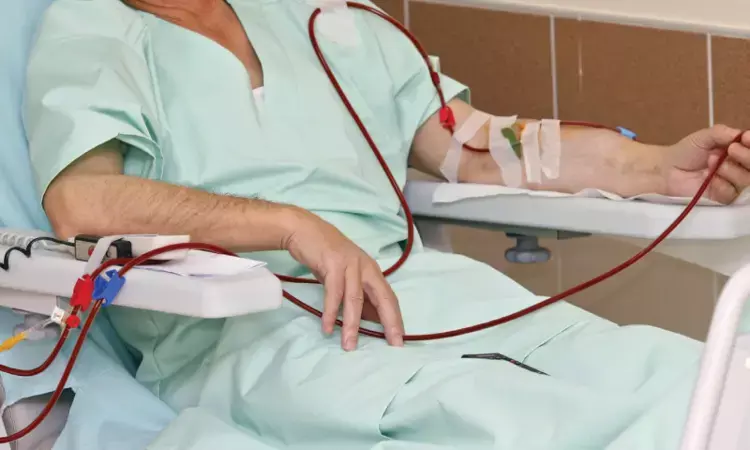- Home
- Medical news & Guidelines
- Anesthesiology
- Cardiology and CTVS
- Critical Care
- Dentistry
- Dermatology
- Diabetes and Endocrinology
- ENT
- Gastroenterology
- Medicine
- Nephrology
- Neurology
- Obstretics-Gynaecology
- Oncology
- Ophthalmology
- Orthopaedics
- Pediatrics-Neonatology
- Psychiatry
- Pulmonology
- Radiology
- Surgery
- Urology
- Laboratory Medicine
- Diet
- Nursing
- Paramedical
- Physiotherapy
- Health news
- Fact Check
- Bone Health Fact Check
- Brain Health Fact Check
- Cancer Related Fact Check
- Child Care Fact Check
- Dental and oral health fact check
- Diabetes and metabolic health fact check
- Diet and Nutrition Fact Check
- Eye and ENT Care Fact Check
- Fitness fact check
- Gut health fact check
- Heart health fact check
- Kidney health fact check
- Medical education fact check
- Men's health fact check
- Respiratory fact check
- Skin and hair care fact check
- Vaccine and Immunization fact check
- Women's health fact check
- AYUSH
- State News
- Andaman and Nicobar Islands
- Andhra Pradesh
- Arunachal Pradesh
- Assam
- Bihar
- Chandigarh
- Chattisgarh
- Dadra and Nagar Haveli
- Daman and Diu
- Delhi
- Goa
- Gujarat
- Haryana
- Himachal Pradesh
- Jammu & Kashmir
- Jharkhand
- Karnataka
- Kerala
- Ladakh
- Lakshadweep
- Madhya Pradesh
- Maharashtra
- Manipur
- Meghalaya
- Mizoram
- Nagaland
- Odisha
- Puducherry
- Punjab
- Rajasthan
- Sikkim
- Tamil Nadu
- Telangana
- Tripura
- Uttar Pradesh
- Uttrakhand
- West Bengal
- Medical Education
- Industry
Study links high oxalate concentrations to sudden cardiac death in dialysis patients

Patients in the highest oxalate quartile (>59.7 M) had a 40% increased risk for cardiovascular events and a 62% increased risk of sudden cardiac death.
Germany: The increased concentration of serum oxalate in dialysis patients raises the risk for cardiovascular events and sudden cardiac death, show results from a post-hoc analysis of the German Diabetes Dialysis Study. The study is published in the Journal of the American Society of Nephrology.
The clinical significance of accumulating toxic terminal metabolites such as oxalate in kidney failure patients is poorly understood. Anja Pfau, Department of Nephrology and Medical Intensive Care, Charité Universitätsmedizin Berlin, Berlin, Germany, and colleagues aimed to evaluate serum oxalate concentrations and risk of all-cause mortality and cardiovascular events in a cohort of kidney failure patients requiring chronic dialysis.
For this purpose, they performed a post-hoc analysis of the randomized German Diabetes Dialysis Study (4D Study); this study included 1255 European hemodialysis patients with diabetes followed up for a median of 4 years.
The analysis included 1,108 European patients (with a median oxalate concentration of 42.4 µM)with diabetes who were on maintenance hemodialysis, with researchers validating the findings in a separate cohort of 104 patients receiving dialysis in the United States.
The research yielded the following findings:
- During follow-up, 548 died, including 139 (25.4%) from sudden cardiac death.
- A total of 413 patients reached the primary composite cardiovascular endpoint (cardiac death, nonfatal myocardial infarction, and fatal or nonfatal stroke).
- Patients in the highest oxalate quartile (≥59.7 µM) had a 40% increased risk for cardiovascular events (adjusted hazard ratio [aHR], 1.40) and a 62% increased risk of sudden cardiac death (aHR, 1.62), compared with those in the lowest quartile (≤29.6 µM).
- The associations remained when accounting for competing risks and with oxalate as a continuous variable.
"Our findings showed that elevated serum oxalate is a novel risk factor for cardiovascular events and sudden cardiac death in dialysis patients," wrote the authors. "However, there is a need for further studies to test whether oxalate-lowering strategies improve cardiovascular mortality in dialysis patients."
Reference:
The study titled, "High Oxalate Concentrations Correlate with Increased Risk for Sudden Cardiac Death in Dialysis Patients," is published in the Journal of the American Society of Nephrology.
DOI: https://jasn.asnjournals.org/content/early/2021/07/19/ASN.2020121793
Dr Kamal Kant Kohli-MBBS, DTCD- a chest specialist with more than 30 years of practice and a flair for writing clinical articles, Dr Kamal Kant Kohli joined Medical Dialogues as a Chief Editor of Medical News. Besides writing articles, as an editor, he proofreads and verifies all the medical content published on Medical Dialogues including those coming from journals, studies,medical conferences,guidelines etc. Email: drkohli@medicaldialogues.in. Contact no. 011-43720751


